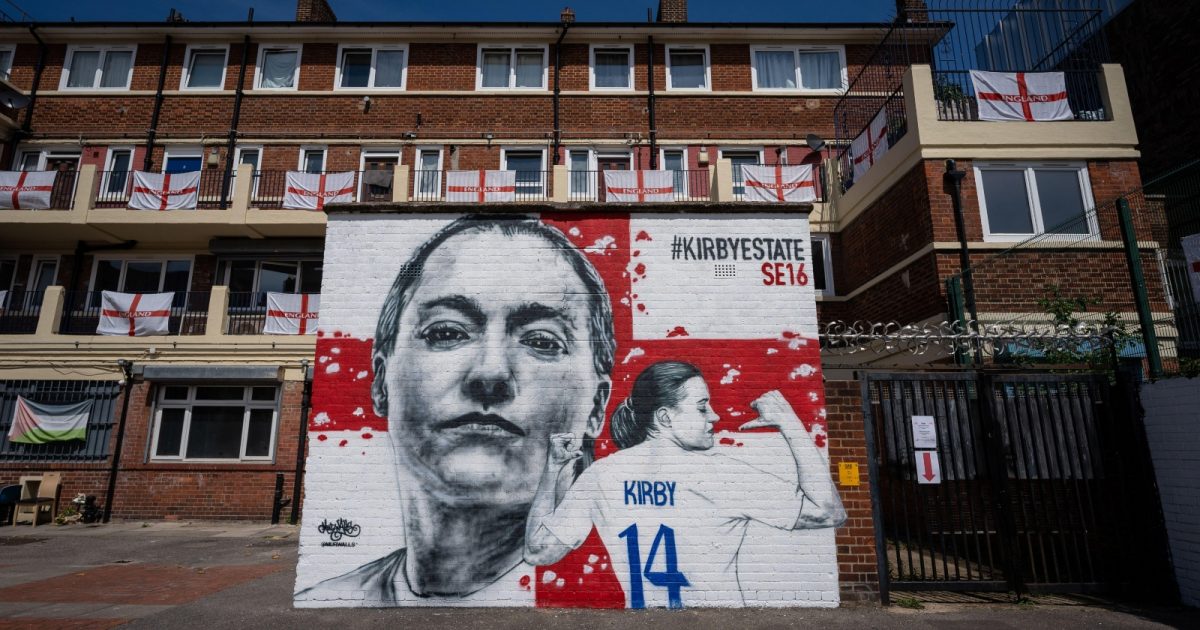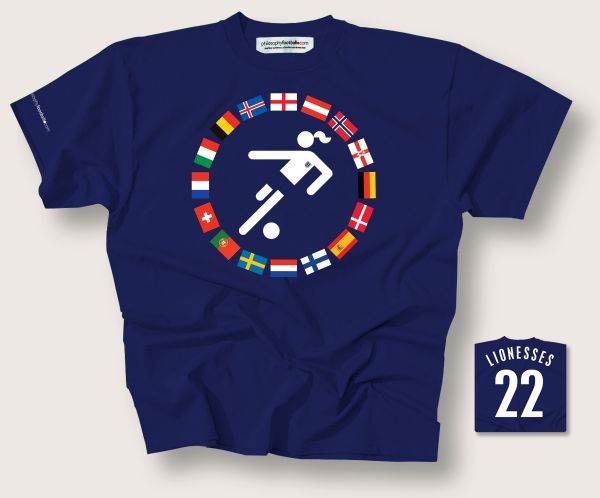
A game of two halves
26.07.22
Mark Perryman of Philosophy Football describes how Euro 2022 is threatening to be a tournament where masculinity is on the losing side.

England? Ingerland! I've written a book (well several actually, articles, interviews, TV and radio broadcasts) on what that one additional syllable symbolises. I thought I knew as much as there was to know, until last Wednesday, England 2 Spain 1, Euro 2022 quarter-final.
My knowledge, such as it is, is partly fandom. From Euro 96 to Euro 2012 I went to just about every England game, home and away, every tournament. That last game, England's exit on penalties to Italy is ten years ago now but the incredible experiences as a travelling England fan have never left me.
Partly activism too. When I first started out England fans' reputation was fearsome. We were the least welcome guests at every Euro or World Cup. Every effort to change this failed, including for Euro 2000 a campaign I helped dream up' Football Yes, Violence No' that failed spectacularly. Why? Because by starting out with a negative aimed at our own fans it threatened to turn into a self-fulfilling negative, and across Holland and Belgium before England went out at the Group Stage, did.
But I learnt a lesson too, to find the elusive positive majority of travelling England fans start with what we all enjoy most, almost as much as the football, the travel. I helped set up LondonEnglandFans travel forums, which grew into a loose network of similar groups across the country. And on trips we'd organise fan-friendly activities, often backed by the British Council, supported by the FA but entirely fan-led. `Do-gooders? Nope. But we weren't sorry to be doing some good. With everything from fans matches against the opposition fans via visits to a local brewery to running a football quiz for schoolkids we reached well beyond England fans' close-to-non-existent constituency of do-gooders to a broad cross selection who just fancied adding an experience bordering on the unique to their trip. And in the process boosting the reputation of an England we were all immensely proud of. A pride that comes with the England fan territory.
And partly intellectual, too. The only books written about England fans were what the late Steve Redhead brilliantly called 'hit 'n tell' including the Brimson brothers string of best sellers and bizarrely written by - tho' a very good book - Granta Editor Bill Buford's Among the Thugs. Meanwhile a growing literature on all things Englishness studiously ignored football. After every tournament from France '98 onwards I'd put together a collection of essays from our fans, opposition fans, our hosts telling an entirely different story to the 'hit 'n tell' brigade or the ghosted players and managers' tournament diaries. And uniquely making the connection between the bi-annual summer of England festooned in St George with the breaking up of Britain.
In 2012 I went to my first women's international. I'd been working on the football tournament at the London Olympics and scored tickets to the women's Wembley Gold Medal match USA vs Japan. It was a kind of football I'd never seen before, fastmoving and skilful yet without much of the brute physicality of the men's game. But most interestingly the crowd which as Mark Steel put it after the women's France v Japan Semi 'the fans were so gleeful they'd be evicted from the ground at an England men's match for being too amicable.' It was the sane at the Final, and then some. Does this mean the first embryonic mass support for international women's football here in England was out for a good time? Well yes, and hurrah to that. But not at the expense of their footballing values. When the loathsome, corrupt, autocratic, and that's putting it nicely, FIFA President Sepp Blatter marched on to the pitch to award USA their Gold Medals he was roundly, universally booed from the stands. Take that for your decades of platitudes about a game of equality Blatter.
Back in Lewes where I live I would occasionally go to watch Lewes Womens FC which under the extraordinary leadership of Karen Dobres has become 'Equality FC'. Much as I valued the iintent I'll admit I didn't entirely get it. Until Lewes, drum roll please, played the newly formed Manchester United Women's team. The crowd was big, full of passion, the result meaning everything but the fact it was Lewes up against United's women rather than their infinitely better known men, frankly irrelevant in the heads of fans of both teams there. Mmm.
Most unlike me I was a tad disorganised getting tickets to the Women's Euros. Since stopping travelling summer tournaments just haven't had the same thrill, being there, over there, nothing else comes close. But when early Saturday morning an email from UEFA, I must have registered for Euro 2022 tickets years ago, offering late availability for England's Quarter-Final vs Spain ust down the road at Brighton's ground, well I couldn't resist.
The week previous, England's game against Norway I'd noticed something interesting of those gathering to head out of Lewes on the ten minute train journey to the game. Unsurprisingly lots of family groups, mums and dads, with their daughters and a fair few sons too. But also young lads, not of the overly laddish variety, but in their England shirts, an England tournament game too good to miss. It's women's football? What the hell. OK ten minutes on the train, cheap tickets, £20, decent seats too, and not, as I was to discover, so difficult to get hold of either. But despite all this it's not that long ago, the Women's Euro 2005 in England to be precise, this would have been unimaginable.
And more changes dawned on me at the Quarter Final too. The air of menace around England home and away can be exaggerated. But here as we crowded into the train and disembarked on to the platform at Falmer it was entirely absent. A football crowd with if anything women and girls in the slight, though not overwhelming, majority quite unlike any other football experience,. Not just at the ground, but in the pubs, workplace and other conversations, lets be honest everything about football as we know it is decidedly masculine. From boomers to zoomers, Generation X to Generation Z this has hardly changed, not one bit.
In so many ways at England v Spain it had. This isn't just about demographics, the politics of representation, this is about cultural change. Big brawny blokes wearing England's training strip combo of pink and bright pastels. The black female house DJ playing dance numbers and women fans all over the stands getting up and dancing. The feminised singalong to Oasis classic Wonderwall, turning a lads anthem back into what it was written as, a love song. The England men's band tub-thumping doing their best to rouse the crowds but a fairly obvious sigh of collective relief when they shut up and there was something else to sing, and dance, along too. This was a crowd here for an England win and enjoy themselves in the process. The so-called 'National Anthem', it isn't, observed but hardly sung with the usual martial gusto. No chants about World War Two, the IRA, the Falklands or Al Qaeda. The last time England met Spain in a Euro Quarter Final, 1996, the Piers Morgan edited Daily Mirror dragged up Francis Drake's sinking of the Spanish Armada to beat up the opposition. And best of all no endless singing of It's Coming Home once England went 2-1 up.
But no Mexican Waves, all too common at Wembley for England men's games. either. This was a crowd who knew how to party, but knew this meant inventing our own traditions, not importing, or having imposed upon us, other's. Sometimes the commodification of fandom did grate. Cards saying 'GOAL" to hold up when England score, where did those come from? Is it really necessary to spell it out E-N-G-L-A-N-D H-A-V-E S-C-O-R-E-D. And the corporate equality-washing smells of a desperation to cover their selling message. From Volkswagen, 'Not Women's Football - Women Play Football'. Really?
Football for all, getting there but not, as it's been observed during the tournament, not yet. English women's football is overwhelmingly white. But this is less about a numbers game than the social construction of sport, any sport. Women's football in England is nowhere near as diverse as the men's game - tho' this is distinctly partial too, how many black and minority ethnic managers in the Premiership and Football League anyone? The women' s game has only recently become professionalised, even more recently paying the kind of wages and providing the kind of platform to become aspirational. The playing side of men's football has never been gentrified unlike every other part of the game, with few exceptions it remains resolutely working class, including the Black and mixed race working class, but not other ethnic minorities. Interestingly a different process of scholarships, and since 1995, professionalism has created a much more multicultural England rugby team than hitherto. Diversity is a product of such structural changes not, even if England win the Euros, the myth of so-called 'role models.'
But on Wednesday night such thoughts s could be put on one side, for now. A change was underway, shaped most importantly of all by the performance on the pitch, both teams. This was as thrilling and nerve-wracking as the knockout stages in a Euro or World Cup gets. Out of this world fitness, astronomical levels of commitment, sky-high skill on the ball. Hard fought, that was obvious even from my position in the stands, but not dirty, likely to cause injury. Yellow cards not quite non-existent but certainly less frequent, and little dissent when issued, compared to the men's game. No medical aid required on the pitch until the 80th minute or so testament to a different kind of physical contest, more about being fitter, faster, more concerned with what can be done with the ball than simply stopping the other lot, dead.
Anyone watching the game via a squint and perhaps oblivious to the England team's preponderance of blonde pony tails would have had no idea this was England women rather than men down on the pitch providing the most exciting 120 minutes of football imaginable. Seated in the stands surrounded by a passion that was both highly visible and loudly audible yet free of any boorishness, triumphalism and hatred of the other lot we might think this is an England we want to be part of, I certainly did, The crowd less toxic? Yes. Down to masculinity? Almost certainly. The kind of male anti-social behaviour that has to be endured every Saturday night city and town centres come closing time yet never makes the news given a platform when occurs at football. The vocabulary of 'hooliganism' serves to obscure this salient, and ugly. fact. Has the support for England women this summer meant all these aspects of masculinity have not been as central to the game as it usually is? Yes. Perhaps rather than rearranging pronouns there's something more profound at work here. Wednesday night was a remarkable achievement in so many ways. Just imagine if they now go on and win it. But win or lose to effect change the processes underway have to be recognised and understood. England vs Sweden, tonight 8pm C'mon Ingerland .
 Mark Perryman is the co-founder of the self-styled 'sporting outfitters of intellectual distinction' aka Philosophy Football. Our Euro 2022 Lionesses T-shirt is available from here
Mark Perryman is the co-founder of the self-styled 'sporting outfitters of intellectual distinction' aka Philosophy Football. Our Euro 2022 Lionesses T-shirt is available from here